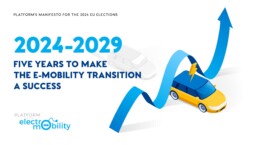Open Letter to Prof. Draghi and EU Heads of States on EU Competitiveness Strategy
Open letter
Platform Chair: Prioritizing EU Competitiveness in the Transport Sector
to Prof. Mario Draghi and EU Heads of States
Industrial competitiveness will be high on the agenda of the Special European Council of 17th and 18th April in Brussels. It has lately tended to overshadow sustainability. We, members of the Platform for Electromobility, a unique coalition of industries, NGOs, and civil society organizations committed to advancing electric mobility across all modes of transportation in Europe, firmly believe there can be no industrial competitiveness without sustainability. The Green Deal has set the course. It is imperative to implement it swiftly and continue in that direction.
The EU does need an industrial strategy to ensure its businesses can complete the transition as planned. In our latest publication, “A 360° e-mobility industry strategy“, you will find five recommendations we believe should be a priority of the next strategic agenda:
-
Ensuring regulatory stability for industries and investors. This means first and foremost ensuring that the European Green Deal legislations as voted in the 2019-2024 mandate remain steady over time.
-
Enhancing value chain competitiveness and resilience. European industrial policy initiatives should see their focus widened from specific components to a more comprehensive approach, spanning from raw materials to end products and from individual to all modes of sustainable transportation.
-
Financing the short-term transition through accessible opportunities. Existing EU funds can already serve as valuable assets if they are distributed efficiently and intelligently, notably by streamlining access to finance, particularly for net-zero industries, through instruments such as the Innovation Fund and InvestEU.
-
Establishing a Net Zero Investment Plan for long-term financing. The STEP platform, although welcomed, unfortunately far from the pan-European response to global competition on cleantech that the EU needs.
-
Strengthening international cooperation. Strengthening ties with diverse regions would diversify sources, reduce geopolitical risks and uncertainties, ensure a secure supply chain, enhance global industrial collaborations, and uphold a fair competitive environment for all clean transport industries.
We urge the European Council and the upcoming report of the future of European Competitiveness to recognise that industrial competitiveness and sustainability are intrinsically linked and cannot go one without the other. Hoping that our recommendations will help shape the policy priorities of the upcoming EU legislative cycle, we stand ready to contribute to the discussions further.
Céline Domecq
Chair of the Platform for Electromobility, 2024
[Video] Charging Infrastructures: A perspective on 2024 by Jayson Dong
2024: Entry into force of AFIR
Jayson Dong, chair of the WG Infrastructures of the Platform for Electromobility, outlines the upcoming opportunities and challenges entailed by the implementation of AFIR in 2024.
Open letter
Accelerating the electrification of fleets is key to cut transport emissions and increase affordable electric vehicles for consumers
To European Commission Executive Vice-President for the European Green Deal,
To the European Commissioner for Climate Action,
To the European Commissioner for Transport,
Maroš Šefčovič
Adina-Ioana Vălean
Wopke Hoekstra
Dear,
First of all, we would like to congratulate Mr Šefčovič and Mr Hoekstra with their appointment respectively as Executive Vice-President for European Green Deal, Interinstitutional Relations and Foresight and Commissioner for Climate Action. We look forward to working together with you and supporting you during the upcoming mandate.
EU action to accelerate fleet electrification represents a golden opportunity to not only tackle transport emissions, EU’s largest source of greenhouse gas emissions, but also widen the access to cheaper second-hand electric vehicles. We therefore very much welcome Vice-President Šefčovič’s pledge during last week’s hearing that “By the end of the year, the Commission will launch a public consultation in preparation for future action to accelerate the electrification of corporate fleets by 2030.”
6 out of 10 cars sold in the EU are company cars, with those vehicles driving twice as much as private cars. The purchasing decisions of corporate fleets have far wider implications than just for that enterprise. Company cars tend to spend 3 to 5 years in a fleet before going into the used car market. With 8 out of 10 Europeans buying their cars in the used car market, this is a crucial channel for EU citizens.
Accelerating the transition towards electric vehicles beyond existing policies is a necessity to achieve transport’s net-zero and the 2040 climate target of -90%. As such, the faster fleets electrify their company cars, the faster more households will be able to access more affordable electric vehicles powered by clean European electricity, the faster we can reduce transport emissions. This is a win-win for climate and consumers.
Corporate fleets are in a great position to lead the way on electrification, with many already committed to fully transitioning their fleets by the end of the decade through Climate Group’s EV100 campaign. On a total cost of ownership basis, electric vehicles have the advantage over polluting vehicles meaning electrification makes strong business sense too. A regulatory framework would simply ensure that all fleets are playing their part.
That’s why the Platform for electromobility – the alliance of uniting automotive industries, NGOs, civil society and cities, the Europe’s leading consumer association and the leading global initiative bringing together fleets committed to electrification – are uniting and calling on you to:
- Deliver on your promise to launch a public consultation by the end of this year at the very latest.
- Limit the scope of the public consultation to legislative options to accelerate fleets electrification of at least 95% by 2030.
- Include light commercial vehicles in the scope of this public consultation.
- As part of this consultation come forward with a timeline for a swift adoption of this legislation.
We hereby reiterate that we fully support the European Commission in setting binding zero emission purchase targets for corporate fleet (passenger cars) of minimum 65% in 2027 and 95% in 2030 and binding electrification targets for light commercial vehicles.
We would very much appreciate a meeting where we can discuss this initiative. We count on your leadership to bring forward a public consultation.
With kind regards,

13th October 2023
2024 Election Manifesto
PLATFORM’S MANIFESTO FOR THE 2024 EU ELECTIONS
2024-2029: Five Years to make the e-mobility transition a Success
The agreement to pursue zero emissions for Europe’s new cars and vans by 2035 backed up by strong charging infrastructure and development of alternatives such as rail network, and the sustainable batteries regulation, has set a clear direction and an unequivocal target for sustainable transport measures.
However, in order to make the Green transition a reality, and bring its benefits to people, the planet and business, it is vital that we act now. Making the transition to e-mobility must be a priority, not simply to deliver environmental sustainability but also to reinforce the EU’s industrial strength, security and competitiveness.
Time to put the Green Deal into action
● The support of the legislative efforts and ambitions of the EU Green Deal and notably The agreement to pursue zero emissions for Europe’s new cars and vans.
● Now it is time to implement those ambitions to reduce Europe’s dependency of fossil fuels, make it a global leader in the sustainable transport industries and priorities quality of life and workspace for Europeans.
● An effective green industrial policy will bring the benefits of Europe’s Green Deal to all.

1st Pillar
A Green and Just Industrial Policy
● Creating an integrated recycling industry ecosystem in Europe.
● Smartening and upgrading existing grid infrastructure to allow it to support greater levels of renewable energy.
● Ensuring strong end-of-life vehicles regulation, focused on low carbon and recycled materials.
2nd Pillar
Investment Plan to implement the Green Deal
● Making it easier for green energy transition sectors to access current EU funding mechanisms.
● Deploying infrastructures to support zero-emission passenger and freight transport across Europe.
● Introducing a dedicated budget for urban nodes, to avoid cities becoming a weak link.


3rd Pillar
People at the heart of the e-mobility ecosystem
● Supporting reskilling programmes to attract workers from traditional industrial sectors and aiding their transition into these emerging sectors.
● Enabling Vehicle-to-Grid (V2G).
● Mandating electric vehicle adoption in corporate fleets.
"It’s time to look ahead and see how the next legislative mandate can put the Green Deal into action. The agreement to pursue zero emissions for Europe’s new cars by 2035 has set a clear direction but this trajectory now needs to be implemented right."
— Julia Poliscanova, Vice-Chair Platform for electromobility
[Video] Peter Badik (GreenWay) on Electricity Market Design
Electricity Market Design
Peter Badik, CEO of GreenWay, on the importance of the reform of the Electricity Market Design.
The Platform for electromobility, uniting industries, civil society organisations and cities from the transport, energy and clean tech sector, welcomes the Electricity Market Reform (EMD) proposal as an important opportunity to support the build-out of grid-friendly e-mobility across Europe. We appreciate the proposals improve the existing electricity market framework in a way that facilitates cost-effective deployment of individual or aggregated smart and bidirectional electric vehicles (EVs) charging. As the EV market is growing rapidly, smart and bidirectional charging will quickly become one of the most important sources of demand-side flexibility. In the collective European effort to decrease fossil gas imports, EV charging flexibility will be instrumental to reduce consumer costs, greenhouse gas emissions and better integrate solar and wind in the grid. Importantly, by offering additional revenues or cost saving opportunities to EV owners, the reform accelerates EV take-up and the clean transport transition.
The Platform therefore urges co-legislators to keep the level of ambition and a swift adoption. The European Commission’s EMD reform proposal supports the uptake of e-mobility in the following ways:
The reform recognises EVs as flexibility resource
Member States will have to make a detailed assessment of the needs and the potential of demand-side response and storage. Based on the assessment, an indicative objective shall be set and supportive measures, such as a flexibility support scheme, may be introduced. It is important to properly include EVs as a source of demand response and storage in both the assessment of the flexibility needs and the objective for demand response and storage, and ensure appropriate participation of EV stakeholders in these assessments processes.
The reform further supports the participation of EVs in the markets
The threshold for participation in the day ahead and intraday markets get lowered to 100 kW, which makes them more accessible to aggregations of EV fleets. This will help develop the market for user-centric smart and bidirectional charging services. It may be advisable to extend this lower threshold also to capacity markets.
The reform accelerates planning for EV charging infrastructure
Transmission and distribution system operators will be financially incentivized to fully consider local demand side resources, such as EVs, when looking for solutions for grid congestion. System operators will propose further transparency and proactivity on their planning for connecting EV charging infrastructure, for example by sharing hosting capacity available for EV charging. This is essential information for providers of EV charging services and helps accelerate grid-efficient build-out of EV charging infrastructure.







